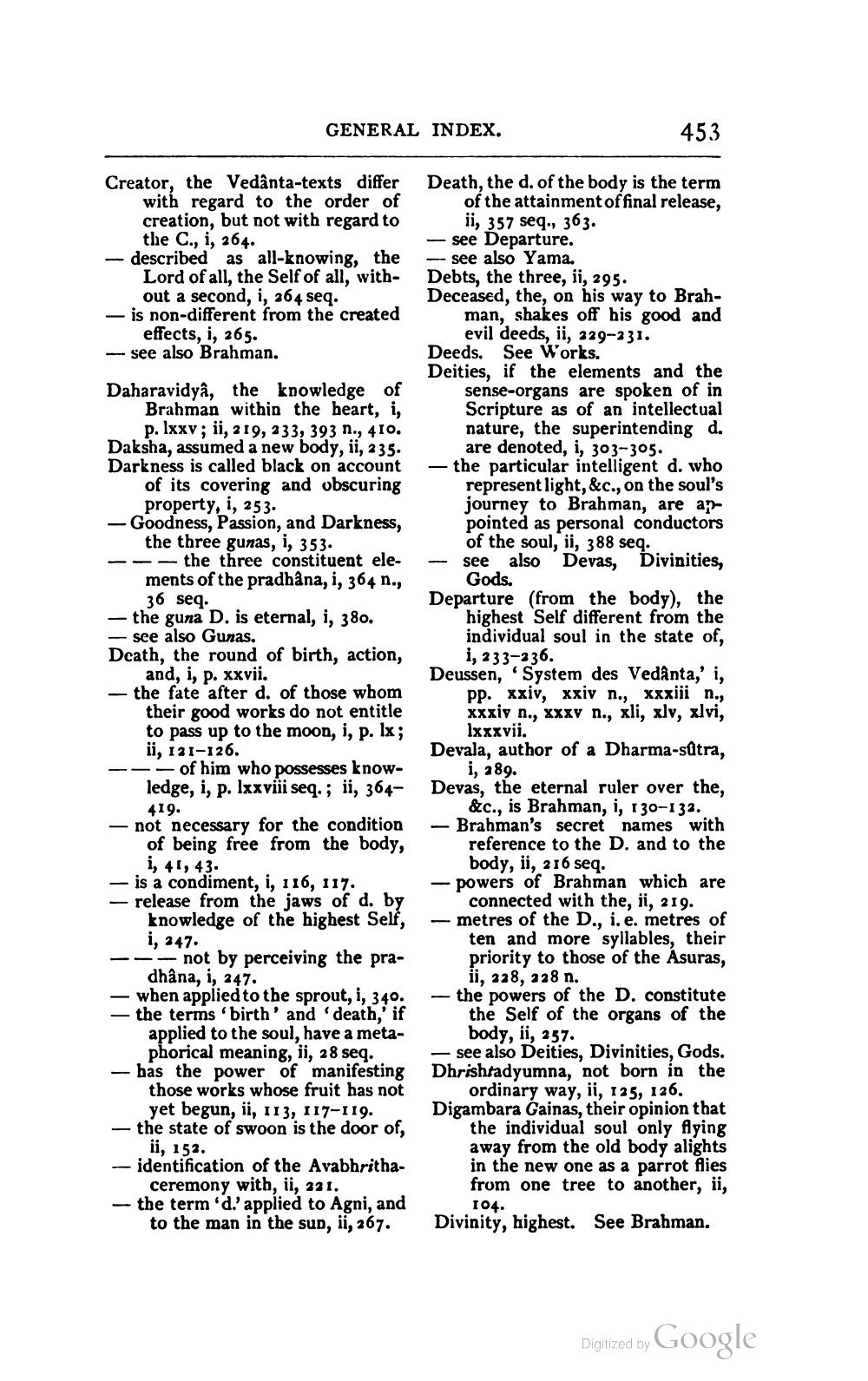________________
GENERAL INDEX.
453
Creator, the Vedanta-texts differ
with regard to the order of creation, but not with regard to
the C., i, 264. - described as all-knowing, the
Lord of all, the Self of all, with
out a second, i, 264 seq. - is non-different from the created
effects, i, 265. - see also Brahman.
Daharavidya, the knowledge of
Brahman within the heart, i,
p. lxxv; ii, 219, 233, 393 n., 410. Daksha, assumed a new body, ii, 235. Darkness is called black on account
of its covering and obscuring
property, i, 253. - Goodness, Passion, and Darkness,
the three gunas, i, 353. --- the three constituent ele-
ments of the pradhana, i, 364 n.,
36 seq. - the guna D. is eternal, i, 380. - see also Gunas. Death, the round of birth, action,
and, i, p. xxvii. - the fate after d. of those whom
their good works do not entitle to pass up to the moon, i, p. lx; ii, 121-126. -- of him who possesses knowledge, i, p. lxxviii seq.; ii, 364-
419. - not necessary for the condition
of being free from the body,
i, 41, 43. - is a condiment, i, 116, 117. — release from the jaws of d. by
knowledge of the highest Self,
i, 247. --- not by perceiving the pra
dhâna, i, 247. when applied to the sprout, i, 340. - the terms 'birth' and 'death, if
applied to the soul, have a meta
phorical meaning, ii, 28 seq. - has the power of manifesting
those works whose fruit has not
yet begun, ii, 113, 117-119. - the state of swoon is the door of,
ii, 152. - identification of the Avabhritha
ceremony with, ii, 221. - the term.d.' applied to Agni, and
to the man in the sun, ii, 267.
Death, the d. of the body is the term
of the attainment of final release,
ii, 357 seq., 363. - see Departure. -- see also Yama. Debts, the three, ii, 295. Deceased, the, on his way to Brah
man, shakes off his good and
evil deeds, ii, 229-231. Deeds. See Works. Deities, if the elements and the
sense-organs are spoken of in Scripture as of an intellectual nature, the superintending d.
are denoted, i, 303-305. — the particular intelligent d. who
represent light, &c., on the soul's journey to Brahman, are ap pointed as personal conductors
of the soul, ii, 388 seq. - see also Devas, Divinities,
Gods. Departure (from the body), the
highest Self different from the individual soul in the state of,
i, 233-236. Deussen, System des Vedanta,' i,
pp. xxiv, xxiv n., xxxiji n., xxxiv n., XXXV n., xli, xlv, xlvi,
lxxxvii. Devala, author of a Dharma-sútra,
i, 289. Devas, the eternal ruler over the,
&c., is Brahman, i, 130-132. - Brahman's secret names with
reference to the D. and to the
body, ii, 216 seq. - powers of Brahman which are
connected with the, ii, 219. - metres of the D., i.e. metres of
ten and more syllables, their priority to those of the Asuras,
ii, 228, 228 n. - the powers of the D. constitute
the Self of the organs of the
body, ii, 257. - see also Deities, Divinities, Gods. Dhrishtadyumna, not born in the
ordinary way, ii, 125, 126. Digambara Gainas, their opinion that
the individual soul only flying away from the old body alights in the new one as a parrot flies from one tree to another, ii,
104. Divinity, highest. See Brahman.
Digitized by Google




